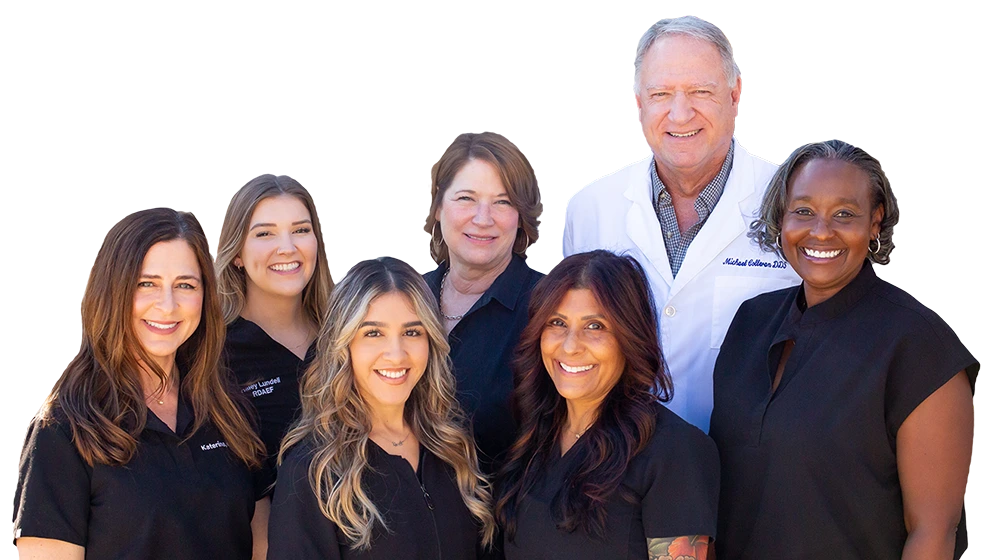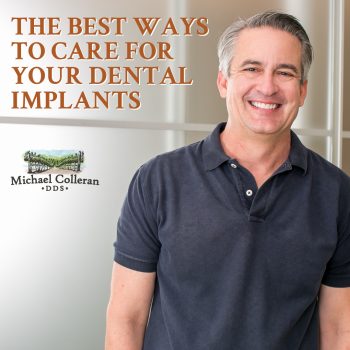Blog

The Best Ways to Care for Your Dental Implants: A San Luis Obispo Guide
 Dental implants are a life-changing investment in your smile, restoring function, aesthetics, and confidence. They allow you to enjoy the beauty of San Luis Obispo’s landscapes and the joy of its community with a radiant smile. However, to ensure their longevity and avoid complications, proper care is essential. Whether you’re considering dental implants or already have them, this guide will provide expert tips on maintaining your health for years to come, so you can keep sharing your smile with the world.
Dental implants are a life-changing investment in your smile, restoring function, aesthetics, and confidence. They allow you to enjoy the beauty of San Luis Obispo’s landscapes and the joy of its community with a radiant smile. However, to ensure their longevity and avoid complications, proper care is essential. Whether you’re considering dental implants or already have them, this guide will provide expert tips on maintaining your health for years to come, so you can keep sharing your smile with the world.
Introduction to Dental Implant Care
Why Proper Care is Crucial for Dental Implant Success
Dental implants are designed to be a long-term solution for missing teeth, but like the natural beauty of our coastline, they require consistent care to maintain their brilliance. Neglecting proper hygiene can lead to complications like peri-implantitis (an infection of the gum and bone around the implant), which can cause implant failure. With the right maintenance, dental implants can last a lifetime, allowing you to enjoy every moment San Luis Obispo has to offer.
Understanding the Components of Your Dental Implant
A dental implant consists of three main parts:
- Implant Post – A titanium screw placed in the jawbone, acting as the tooth’s root.
- Abutment – A connector piece that attaches the implant post to the crown.
- Crown – The visible, tooth-like restoration placed on top of the abutment.
Each component requires proper care to maintain function and aesthetics, ensuring your smile remains as stunning as our local sunsets.
Daily Oral Hygiene Practices for Dental Implants
Brushing Techniques for Dental Implants
Brushing your dental implants properly helps prevent plaque buildup and gum disease. Follow these best practices:
- Use a soft-bristled toothbrush to avoid scratching the implant surface.
- Brush at least twice a day using gentle, circular motions.
- Pay close attention to the gumline where plaque tends to accumulate, keeping your smile as healthy as our local environment.
Flossing Around Your Dental Implants: The Right Way
Flossing is essential to remove food particles and bacteria from hard-to-reach areas:
- Use implant-specific floss or unwaxed dental floss.
- Wrap the floss around the implant and gently slide it between the gum and crown.
- Consider water flossers for an easy, effective way to clean between implants, ensuring your smile stays fresh and clean.
The Importance of Interdental Brushes
Interdental brushes are a great tool for implant care:
- They help clean between implants and natural teeth.
- Look for soft, non-metal brushes to avoid damaging the implant surface.
- Use them once daily to maintain optimal gum health, keeping your smile bright and vibrant.
“Living in San Luis Obispo means embracing an active, healthy lifestyle. Whether you’re hiking Bishop Peak or enjoying a sunset at Avila Beach, your smile should be a source of confidence, not concern,” says Dr. Colleran. “We’re here to help you maintain your implants with expert care, so you can fully enjoy every moment our beautiful city offers.”
Choosing the Right Oral Hygiene Products
Selecting a Toothpaste for Dental Implants
Avoid abrasive toothpastes containing baking soda or whitening agents, as these can scratch implant surfaces. Instead, choose a low-abrasive, fluoride toothpaste designed for sensitive teeth, ensuring your implants stay polished and protected.
Mouthwash Recommendations for Implant Health
An antimicrobial, alcohol-free mouthwash can help reduce bacteria around implants. Look for mouthwashes with chlorhexidine or hydrogen peroxide, but avoid long-term use, as these can stain teeth. Keep your smile as clean as our ocean air.
Water Flossers and Dental Implants
Water flossers are effective for cleaning around implants:
- They remove plaque without damaging the implant structure.
- Use low to medium pressure to avoid irritating the gums.
- Opt for a water flosser with an implant-specific tip for best results, giving you a refreshing clean.
The Role of Regular Dental Checkups in San Luis Obispo
Why Professional Cleanings Are Essential
Even with good at-home care, professional cleanings are necessary to remove hardened plaque and prevent gum disease. Dental hygienists use implant-safe instruments to clean around the implant without scratching its surface, keeping your smile healthy and strong.
What to Expect During a Dental Implant Checkup
During an implant checkup at Michael Colleran, DDS, you can expect:
- A thorough examination of your implants and surrounding gum tissue.
- Digital X-rays to monitor bone health and detect any hidden issues.
- A professional cleaning using specialized tools designed for implants.
Early Detection and Prevention of Complications
Routine checkups allow for early detection of potential problems such as:
- Gum inflammation or infection (peri-implantitis).
- Minor shifts in implant position due to bone changes.
- Wear and tear on implant components that may need adjustments.
Lifestyle Factors Affecting Dental Implant Longevity
The Impact of Diet on Implant Health
Eating a balanced diet supports gum and bone health, promoting implant longevity. Some key dietary tips include:
- Eat calcium-rich foods (dairy, leafy greens) to support bone strength.
- Avoid sticky, hard, or overly crunchy foods that could damage the implant crown.
- Drink plenty of water to help flush away bacteria and food particles, keeping your smile as healthy as our local produce.
Smoking and Dental Implant Failure
Smoking is one of the leading causes of implant failure. It:
- Reduces blood flow to the gums, slowing healing.
- Increases the risk of peri-implantitis and bone loss.
- Lowers the success rate of implants by up to 20% compared to non-smokers.
Managing Bruxism (Teeth Grinding)
Grinding your teeth at night can put excessive pressure on implants, leading to damage. If you suffer from bruxism:
- Wear a custom-fitted nightguard to protect your implants.
- Reduce stress, as anxiety is a common cause of grinding.
- Avoid caffeine and alcohol before bedtime, as these can trigger bruxism.
Common Dental Implant Problems and Solutions
Recognizing Signs of Peri-Implantitis
Peri-implantitis is a gum infection around the implant, similar to gum disease. Signs include:
- Red, swollen, or bleeding gums.
- A bad taste or persistent bad breath.
- Loosening of the implant.
Dealing with a Loose Dental Implant
A loose implant can be caused by bone loss, a loose abutment, or implant failure. If you notice movement, contact Dr. Colleran immediately for evaluation, ensuring your smile stays secure.
What to Do if You Experience Pain or Swelling
Mild discomfort after implant placement is normal, but persistent pain or swelling may indicate an infection. Seek dental care promptly to prevent complications, ensuring your comfort and well-being.
Long-Term Care and Maintenance of Dental Implants
Protecting Your Investment
Your implants are an investment in your health and smile. Follow these steps to keep them in top shape:
- Maintain excellent oral hygiene.
- Visit your dentist every six months for a checkup.
- Avoid habits like nail-biting or chewing on ice that can damage the implant crown.
When to Replace Dental Implant Components
While the implant post is designed to last a lifetime, the crown may need replacement every 10–15 years due to wear and tear.
Expert Dental Implant Care at Michael Colleran, DDS in San Luis Obispo
At Michael Colleran, DDS, we specialize in comprehensive implant care to ensure long-term success. Dr. Colleran’s expertise in implant dentistry and advanced technology allows us to provide personalized care tailored to your needs, ensuring your smile remains a reflection of San Luis Obispo’s natural beauty.
Schedule Your Dental Implant Checkup Today
If you have dental implants or are considering them, schedule an appointment with Dr. Michael Colleran in San Luis Obispo to ensure your implants stay healthy for years to come, keeping your smile as radiant as our local sunshine.
Disclaimer: The content of this blog is not intended to be a substitute for professional medical advice, diagnosis, or treatment. Always seek the advice of qualified health providers with questions you may have regarding medical conditions.










